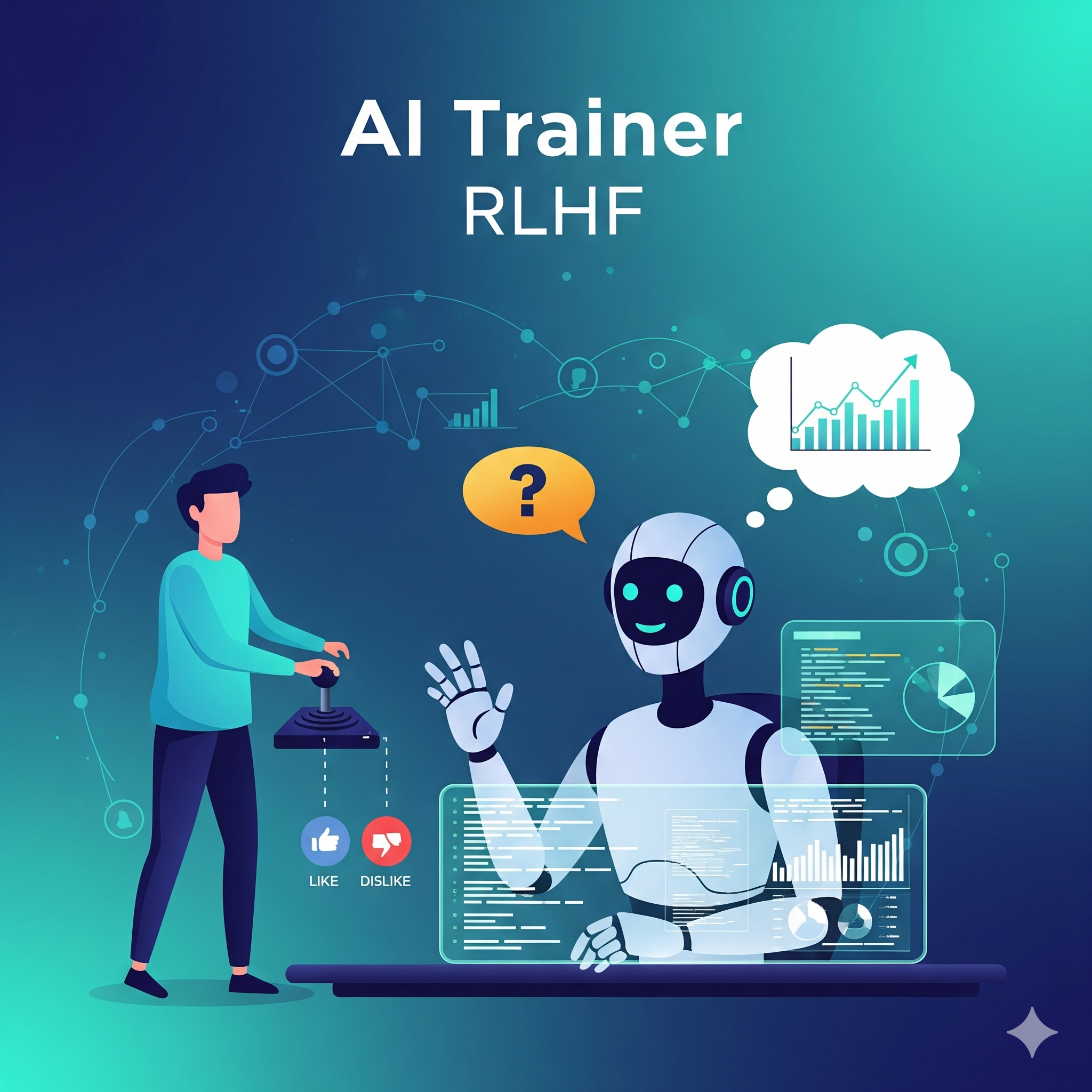What is an AI Trainer?
An AI Trainer is a specialist who teaches AI models, particularly large language models (LLMs), to behave in a way that is more helpful, accurate, and aligned with human values. This role goes beyond simple data annotation by actively engaging in a process called Reinforcement Learning from Human Feedback (RLHF). Instead of just labeling data, an AI Trainer provides direct feedback on an AI's outputs, ranking them and guiding the model toward more desirable responses. This human-in-the-loop approach is crucial for moving AI from merely mimicking text to truly understanding context, nuance, and user intent.
Key Responsibilities
The daily tasks of an AI Trainer are focused on evaluating and refining AI model behavior:
- Evaluating AI-Generated Content: Critically analyzing and rating multiple AI-generated responses to the same prompt. This involves comparing outputs and choosing the best one based on criteria like relevance, factual accuracy, tone, and safety.
- Providing Feedback for RLHF: Submitting structured feedback that is used to train a reward model. This reward model learns to predict human preferences, which then guides the AI's future behavior through reinforcement learning.
- Prompt Engineering: Crafting diverse and challenging prompts and scenarios to stress-test the AI model. This helps identify and improve the model's performance on a wide range of topics and complex instructions.
- Identifying and Flagging Bias: Acting as a crucial line of defense against biased, misleading, or inappropriate content. Trainers are responsible for flagging and documenting problematic outputs to ensure the AI adheres to ethical and safety standards.
- Fine-Tuning Models: For more advanced roles, an AI Trainer may be involved in fine-tuning models on specific datasets to align them with a particular domain, such as legal, medical, or financial contexts.
- Communicating Insights: Documenting and communicating findings on model performance to machine learning engineers, data scientists, and project managers. This helps the technical team understand where the model needs improvement.
Essential Skills and Qualifications
An effective AI Trainer possesses a unique combination of critical thinking and strong communication skills.
Hard Skills
- Exceptional Written Communication: The ability to write clearly, concisely, and with nuance is paramount, as this is the primary way trainers interact with and improve the model.
- Computer and Software Proficiency: Must be comfortable learning and using new AI training platforms and interfaces.
- Knowledge of AI/ML Concepts: A foundational understanding of how AI models are trained, particularly the concepts of supervised learning, reinforcement learning, and LLMs, is highly beneficial.
- Basic Programming (beneficial): While not always required, basic scripting skills in languages like Python can be helpful for certain tasks.
Soft Skills
- Sharp Critical Thinking: The capacity to evaluate complex information, make subtle distinctions between good and bad responses, and follow intricate guidelines.
- Meticulous Attention to Detail: Small errors in feedback can have a large impact on the model, so precision is key.
- Curiosity and Problem-Solving: The work is investigative. Trainers must be curious, ask questions, and be able to identify and troubleshoot why a model is behaving a certain way.
- Strong Ethical Judgment: The responsibility of ensuring AI is safe and unbiased requires a strong ethical compass.
The Role's Importance in AI
AI Trainers are a critical part of the AI development pipeline, directly influencing how AI systems behave in the real world. They are the human element that ensures AI is not just intelligent but also helpful, harmless, and aligned with human values. The rise of AI chatbots like ChatGPT and Gemini has made this role indispensable for creating models that can engage in natural, safe, and productive conversations.
Career Path and Outlook
The AI Trainer role is an excellent entry point into the AI industry for individuals with a strong writing and analytical background. The field is growing rapidly, with demand for trainers across various industries. Potential career paths from this role include:
- Prompt Engineer: A specialist focused on crafting and refining prompts to achieve specific outcomes from AI models.
- Data Scientist or Data Analyst: A role that involves analyzing larger datasets to uncover trends and insights.
- AI Quality Assurance Lead: A leadership position focused on managing teams and ensuring the highest standards of data and model quality.
- Machine Learning Engineer: With further technical education, an AI Trainer can transition into a role focused on building and deploying AI models.
Tips for Getting Started
- Start with Freelance Platforms: Many opportunities are available on platforms like Upwork and specialized AI training platforms, offering a flexible way to gain experience.
- Highlight Your Soft Skills: On your resume and in interviews, emphasize your ability to think critically, communicate effectively, and learn quickly.
- Showcase Your Writing Skills: Create a portfolio of your best writing or demonstrate your ability to articulate complex ideas clearly.
- Take Online Courses: Look for courses on prompt engineering, machine learning basics, or natural language processing to gain a foundational understanding of the field.
Potential Challenges
- Repetitive Tasks: While more complex than traditional data annotation, the work can still be repetitive, requiring a high degree of focus.
- Subjective Judgments: Evaluating AI outputs can sometimes be subjective, requiring you to make difficult decisions based on ambiguous guidelines.
- The Pace of Change: The AI industry is evolving at a rapid pace, requiring a commitment to continuous learning and adaptation.
Despite these challenges, a career as an AI Trainer offers a unique and impactful way to contribute to the future of technology, blending human creativity and judgment with the power of artificial intelligence.
